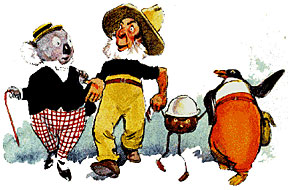Pudding, published in 1918 in Australia, is the story of a koala (Bunyip Blugum), a sailor (Barnacle Bill), and a penguin (Sam Sawnoff). They own an inexplicably weird magic pudding, who goes by the name Albert, insists on people constantly eating him, changes flavors at request, replenishes himself mysteriously after each meal, and is perpetually grouchy.
 Essentially this is a story about eating and fighting, which Lindsay considered to be the two topics of prime interest for children. The Pudding Owners are constantly battling the wily Pudding Thieves (a scheming possum and wombat). It's a nonsensical setup with no clear plot, simply moving from one outrageous episode to the next, similar to Lewis Carroll's Alice stories. The highlights of the book are the manifold songs and poems (very silly indeed) and the drawings. Lindsay was actually a professional artist, a satirical cartoonist with a healthy disrespect for authority, and this translates wonderfully into drawings of a gruff sailor and pudding shaking their fists angrily at their offenders or the final chaotic trial scene (watch a great video featuring many of the sketches here).
Essentially this is a story about eating and fighting, which Lindsay considered to be the two topics of prime interest for children. The Pudding Owners are constantly battling the wily Pudding Thieves (a scheming possum and wombat). It's a nonsensical setup with no clear plot, simply moving from one outrageous episode to the next, similar to Lewis Carroll's Alice stories. The highlights of the book are the manifold songs and poems (very silly indeed) and the drawings. Lindsay was actually a professional artist, a satirical cartoonist with a healthy disrespect for authority, and this translates wonderfully into drawings of a gruff sailor and pudding shaking their fists angrily at their offenders or the final chaotic trial scene (watch a great video featuring many of the sketches here).One of the most unique and amusing details about Pudding is the character's language. The characters have a wide vocabulary, and they mix high-falutin' language with hilarious slang. It's slightly reminiscent of Bertie Wooster. For example:
" 'This is what I call satisfactory,' said Bill, as they sat at breakfast next morning. 'It's a great relief to the mind to know that them puddin'-thieves is sufferin' the agonies of remorse, and that our Puddin' is safe from bein' stolen every ten minutes.'
'You're a bun-headed old optimist,' said the Puddin' rudely. 'Puddin'-thieves never suffer from remorse. They only suffer from blighted hopes and suppressed activity.' "
Moon's protagonists, by contrast, are two young sisters, Dinah and Dorinda, cursed with a year of naughty behavior when their father observes "there is a wind on the moon" (don't ask me to explain it). The sisters' father goes to war, and they're left in the care of their distracted mother and tiresome tutor in a small town. The girls go from one adventure to the next, eating until they swell to huge balloons, then crying until they waste away, visiting a witch in the forest, turning themselves into kangaroos and being put in the local zoo, helping the zoo animals solve a mystery, freeing a puma and falcon (who become their devoted friends), helping their dance instructor escape from prison, etc. Like many children, Dinah and Dorinda are confounded by how often their well-intentioned acts are scolded by adults. It is a bit of a growing-up book as the girls become more and more clever and unselfish. It also contains one detail (in common with Pudding) I love about British children's books in the early to mid 20th century: long lists of food. (The book was published in 1944, so rations probably provided some inspiration.) Ultimately Moon is a book about freedom, and though it is unarguably whimsical, there's an underlying quest for liberty, even if that quest is at times judged to be rather naughty.





